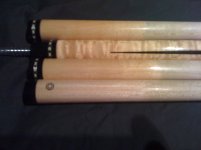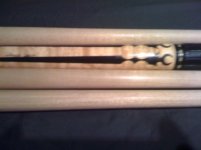Greetings all!
I've been playing pool for about 15 years and up until this year, I've always played with production cues like viking, meucci, and predator. I recently got a bit of a wild hair and traded into a pair of Gilbert customs, then traded those for a very nice Josey custom. The reason for my post is because I am looking for a hobby. I would like to make a few pieces of equipment for myself. I already have the leather and most of the materials that I need to construct my case. I've also drawn blue prints with shapes and dimensions of the finished product. Once I finish that (about a month or so out because of the tooling) I will be looking to start construction on a cue.
The reason for this "10 mile" post is because I honestly don't have a clue where to start, what equipment I would need, etc. I've always been very good with my hands, and I learn very quickly so I don't think actually doing the work will be the issue as much as knowing what work to do... For example, I became the "go-to-guy" for shaft/ferrule/tip maintenance in my locale after I knocked the tip off of my girlfriend's break cue and had to put a new one on before I got in trouble! But anyway, I know there is a ton of knowledge out there, so I figure that its time to ask!
But anyway, I know there is a ton of knowledge out there, so I figure that its time to ask!
***Note: I have absolutely NO PLANS to start making cues to sell, I simply just want something to engage myself in so that I stay out of trouble***
I've been playing pool for about 15 years and up until this year, I've always played with production cues like viking, meucci, and predator. I recently got a bit of a wild hair and traded into a pair of Gilbert customs, then traded those for a very nice Josey custom. The reason for my post is because I am looking for a hobby. I would like to make a few pieces of equipment for myself. I already have the leather and most of the materials that I need to construct my case. I've also drawn blue prints with shapes and dimensions of the finished product. Once I finish that (about a month or so out because of the tooling) I will be looking to start construction on a cue.
The reason for this "10 mile" post is because I honestly don't have a clue where to start, what equipment I would need, etc. I've always been very good with my hands, and I learn very quickly so I don't think actually doing the work will be the issue as much as knowing what work to do... For example, I became the "go-to-guy" for shaft/ferrule/tip maintenance in my locale after I knocked the tip off of my girlfriend's break cue and had to put a new one on before I got in trouble!
***Note: I have absolutely NO PLANS to start making cues to sell, I simply just want something to engage myself in so that I stay out of trouble***


